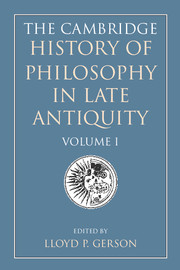Book contents
- Frontmatter
- General introduction
- I Philosophy in the later Roman Empire
- II The first encounter of Judaism and Christianity with ancient Greek philosophy
- III Plotinus and the new Platonism
- IV Philosophy in the age of Constantine
- V The second encounter of Christianity with ancient Greek philosophy
- Introduction to Part V
- 24 Basil of Caesarea
- 25 Gregory of Nyssa
- 26 Gregory of Nazianzus
- 27 Calcidius
- 28 Nemesius of Emesa
- 29 Synesius of Cyrene
- 30 Marius Victorinus
- 31 Augustine
- Map 1 The Byzantine Empire, c. 500
30 - Marius Victorinus
from V - The second encounter of Christianity with ancient Greek philosophy
Published online by Cambridge University Press: 28 May 2011
- Frontmatter
- General introduction
- I Philosophy in the later Roman Empire
- II The first encounter of Judaism and Christianity with ancient Greek philosophy
- III Plotinus and the new Platonism
- IV Philosophy in the age of Constantine
- V The second encounter of Christianity with ancient Greek philosophy
- Introduction to Part V
- 24 Basil of Caesarea
- 25 Gregory of Nyssa
- 26 Gregory of Nazianzus
- 27 Calcidius
- 28 Nemesius of Emesa
- 29 Synesius of Cyrene
- 30 Marius Victorinus
- 31 Augustine
- Map 1 The Byzantine Empire, c. 500
Summary
LIFE AND WRITINGS
Our sources for the vita et opera of Marius Victorinus – Jerome, Augustine, Boethius, and Cassiodorus – depict him as a celebrated teacher of rhetoric and a scholar, ‘who had read and weighed so many of the philosophers’ (Augustine, Conf. 8.2.3). His surviving pre-Christian works, however, barely hint at the metaphysical interests on display in his theological treatises, which constitute one of the most audacious ventures in philosophical theology to arise within credal orthodoxy, still nascent in his time. Bringing an exceptional level of philosophical learning to the theological debates rending the Church, Victorinus interpreted the Christian Trinity in line with currents of Platonist theology, incidentally preserving inadequately witnessed phases of the history of philosophy.
Born in Roman Africa c. 280, Victorinus attained local renown as state professor of rhetoric in Rome. Honoured late in his career in 354 with a statue in Trajan’s Forum (Jerome, Chronicon 2370), he was subsequently elevated to the senatorial order. Shortly thereafter (probably 355), Victorinus converted to Christianity ‘in advanced old age’ (Jerome, De vir. ill. 101) after a period of purely intellectual adherence (Augustine, Conf. 8.2.4). Augustine (Conf. 8.5.10) recounts Victorinus’ subsequent resignation from his chair when Emperor Julian in an anti-Christian measure mandated (17 June 362; Cod. Theod. 13.3.5) that academic appointees be approved by municipal council and emperor.
Keywords
- Type
- Chapter
- Information
- The Cambridge History of Philosophy in Late Antiquity , pp. 538 - 551Publisher: Cambridge University PressPrint publication year: 2000

